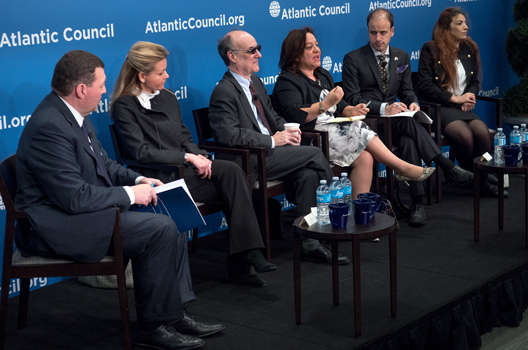
Libyan foreign minister seeks US engagement in effort to root out terrorists
Amid concern that the Islamic State of Iraq and al-Sham (ISIS) is regrouping in Libya, Mohamed Taher Syala, the foreign minister in Libya’s internationally recognized, Tripoli-based Government of National Accord (GNA), said the United States must remain committed to defeating the terrorists in his country.
More than five years after its longtime ruler, Moammar Gadhafi, was ousted and killed in an Arab Spring-inspired uprising, Libya remains mired in chaos. It has two rival governments and is awash in weapons and independent militias. ISIS has sought to exploit this chaos in the North African nation.
In the summer of 2016, the United States conducted drone strikes against ISIS targets in the coastal city of Sirte. Troops loyal to the GNA—mostly militias from the western city of Misrata—also helped shatter ISIS’ control over its stronghold in Sirte.
Syala praised the US military intervention. “Without those attacks, it would be very difficult for our forces to conquer Daesh in that area,” he said in an interview with the New Atlanticist on March 23. ISIS is also known as Daesh.
Asked whether he expects a similar engagement from the new administration of US President Donald Trump, who has expressed a commitment to fighting terrorists, Syala said: “I think so, because it is worrying them as it is worrying us. The danger is not just for Libya, but for the region and the international community as well.”
Syala was in Washington where he participated in a meeting of foreign ministers from sixty-eight nations that are part of the global coalition aligned against ISIS.
Following the meeting, the ministers from the coalition released a statement that welcomed the “pledges by coalition partners to assist with stabilization, demining, humanitarian, and public safety requirements in liberated areas of Iraq and Syria.”
“We are gratified that partners have already pledged more than two billion dollars for such assistance in 2017 and continue to provide other vital support… Such contributions will create the conditions necessary for local reconciliation and for affected families to return home voluntarily, safely, with dignity, and at a time of their choosing,” they added.
Syala, however, expressed skepticism about the international community’s ability to meet its financial commitment to the effort to defeating ISIS.
“I doubt that they will implement their promises, especially when it comes to financing,” he said. “From our experience, many countries promise and… then don’t meet their commitment.”
Syala raised his concerns in Washington. He was told that the countries will “do their utmost to meet their commitments.”
While the US drone strikes succeeded in scattering ISIS in 2016, the group’s leaders are now reported to be regrouping. Under pressure in their strongholds in Syria and Iraq, there is a risk that the militants could flock to Libya.
Syala described the threat ISIS poses to his country as “complicated” by Libya’s vast size, long land and sea borders, and comparatively sparse population. His government has sought help from the international community to set up an “electronic control” of Libya’s borders, controls that Syala described as similar to the ones along the US-Mexico border.
While some European countries—like Italy—have reacted positively to this request, others—like the Scandinavian nations—have not, the minister said. Italy, which has borne the brunt of the influx of migrants streaming north from the Middle East and Africa through Libya and onwards to Europe, is helping build the capacity of the Libyan coast guard.
The UN-backed Government of National Accord, led by Prime Minister Fayez Serraj, is also working toward cooperation with its neighbors—Chad, Niger, and Sudan—to jointly control the border.
Political instability
In their statement following the meeting of the global coalition in Washington, the ministers also noted that “the continued political and security instability in Libya risks undermining the strategic objectives of political reconciliation and countering terrorism.” They called on all parties, including the militias, to resolve their differences through dialogue and national reconciliation.
“To support stability in Libya you need to push ahead with full implementation of the political agreement,” said Syala. “In the absence of implementing the political agreement things will get worse.”
Libya has two immediate needs, said Syala. First, to convince Gen. Khalifa Haftar, Libya’s eastern-based military commander, to recognize the political agreement and work under the political leadership. Second, to convince Aqilah Saleh, the speaker of the Tobruk-based House of Representatives, to “practice what parliaments are expected to do, which is to issue laws and control the government,” and not interfere with tasks that are the responsibility of the presidential council, Syala said.
Syala said he does see a role for Haftar in Libya. “He is nominated by the parliament and he is a legitimate commander in chief,” he said. “If he wants to resign from the army and weigh himself in the election, we are not against that. It is the right of any citizen, but we don’t want a military regime. We got rid of a dictator and a military regime. We don’t want to substitute [Gadhafi] with a dictator.”
Ashish Kumar Sen is deputy director of communications at the Atlantic Council. You can follow him on Twitter @AshishSen.
Image: (from left) Karim Mezran, senior fellow with the Atlantic Council's Rafik Hariri Center for the Middle East, moderated a discussion with Federica Saini Fasanotti, nonresident scholar at the Brookings Institution; Jonathan Winer, a former US State Department special envoy for Libya; Azza Maghur, senior lawyer at Maghur & Partners; Jason Pack, executive director of the US-Libya Business Association; and Nebras Attia, human rights activist. (Atlantic Council/Bradley Howard)
